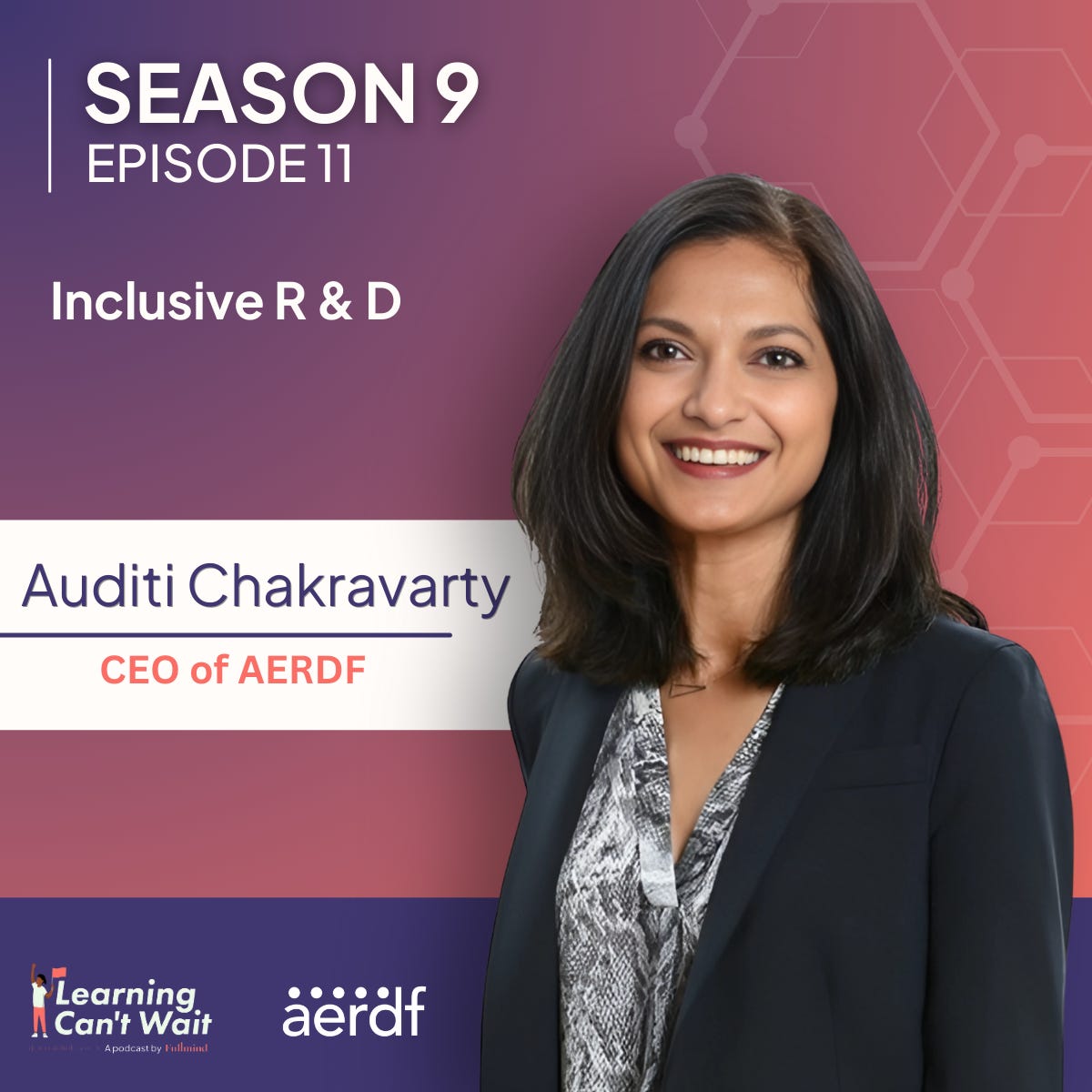Auditi Chakravarty | Inclusive R & D
In the newsletter today: New models for research & Post-Katrina Education
🎙️ Tuesday’s Learning Can’t Wait Episode
Auditi Chakravarty’s story is one of grit, brilliance, and belonging. Growing up as the child of immigrants in rural Midwest America, she knows firsthand what it feels like to face limited access and cultural isolation and how a family’s deep belief in the power of education can change everything. Those early experiences still drive her focus today: building schools and systems where every student feels seen, included, and challenged.
In today’s episode Chakravarty shares the beginnings of her career where she started out as a high school English teacher, and she’s honest about the challenges educators face—especially the lack of real preparation around the science of learning and development. That gap is precisely the focus of the Advanced Education Research & Development Fund (AERDF), the organization where she and her team are on a mission to bridge the worlds of research, products, and practice. And the way they do it is pretty different: rapid, inclusive R&D cycles where teachers and students are true co-designers. One of my favorite examples is Fraction Ball—a math project dreamed up and tested with educators and kids that makes learning both rigorous and fun. I am absolutely trying this game at home with my boys.
We also dig into AI—because, of course, you can’t talk about the future of education without it. Auditi sees the promise: more efficiency for teachers, more access for students. But she’s also clear about the risks. What does AI actually do to developing brains? How do we make sure it doesn’t widen the digital divide? These are the questions she wants us all asking now.
Looking ahead, Auditi’s vision is ambitious (and contagious): a culture of research and development in U.S. education where tools, policies, and classrooms are all accountable to one thing—serving kids and their brilliance. And if you’re a new teacher? Her advice is gold: always see the brilliance in your students, and pace yourself for the long game. This work isn’t about quick wins—it’s a lifelong journey.
📚 What I’m Reading
Should it take a hurricane to reform schools?
Of course not.
But did Hurricane Katrina spark one of the most radical school reform experiments in U.S. history? I’d say yes—and the data backs it up. A recent NPR piece sheds light on the education landscape of New Orleans twenty years later.
After the storm, thousands of educators lost their jobs, the state took over most schools, and publicly funded but privately run charters replaced much of the old system. I remember it vividly: in 2007, many of my college friends joined Teach for America in New Orleans, stepping into classrooms where some students hadn’t had formal schooling in nearly two years.
The shift was disruptive—and controversial—but it also drove real academic gains. Test scores, graduation rates, and college enrollment climbed. Closing low-performing schools and testing out new models showed what was possible.
But it wasn’t all progress. Families’ experiences often depended on their socioeconomic status and school access. Concerns about school closures, harsh discipline policies, the loss of neighborhood schools, and the decline in Black teacher representation are still very real. And critics rightly ask: if success comes only after a crisis, is it replicable, or even desirable?
I think that tension is healthy. Skepticism keeps the education reform movement honest. If we all agreed, we’d never push ourselves to build better systems for kids.
Personally, I’m encouraged by what public charters in New Orleans proved was possible in a post-Katrina world. But my hope is broader: that we take those lessons and work toward similar results across all public schools—charter and traditional alike.
If you’re curious, read it here.
*On a related note, The 74 Million launched a podcast digging into this very topic and spotlighted the incredible work at Collegiate Academy, led by CEO Jerel Bryant and Founder Ben Marcovitz. Their episode of Learning Can’t Wait—recorded a few years back—still stands out as one of my all-time favorites.


